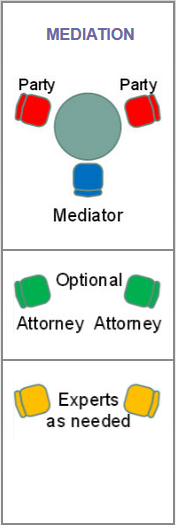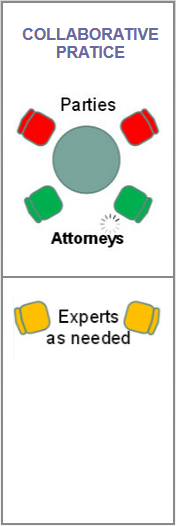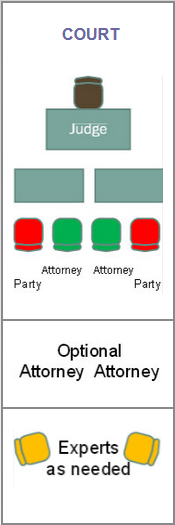Divorce Options – Four Processes Used to Obtain a Divorce
As the following chart shows, when you face separation and divorce, you have four main processes to resolve differences and obtain a divorce:
- Uncontested Divorce (Kitchen Table Negotiations)
- Mediation
- Collaborative Practice
- Litigation through the Courts
KITCHEN TABLE
 The “kitchen table” approach is an informal process used by some couples with relatively uncomplicated divorce cases work out agreements. Couples sit down and come to agreement on all legal issues.
The “kitchen table” approach is an informal process used by some couples with relatively uncomplicated divorce cases work out agreements. Couples sit down and come to agreement on all legal issues.
You and your spouse can prepare your own written summary of the agreement and have an attorney or paralegal draft the legal documents incorporating it.
At Weintraub Law Office, our flat-fee uncontested divorce process is simple:
- The client schedules an initial consultation. At the meeting, all of the major issues in the divorce and settlement terms reviewed. A flat fee agreement is signed.
- The client completes a divorce questionnaire to provide details to complete the divorce paperwork.
- We review the paperwork and return it for final signature.
- The paperwork is filed with the court, and after the 90 day waiting period, entered with the court.
Though this process is relatively inexpensive and quick, it is usually only successful if you and your spouse are amicable and your case does not involve complex legal issues.
MEDIATION

Mediation is a way of resolving disputes where you and your spouse use a third party neutral facilitator to reach agreement on disputed issues.
A mediator helps you identify issues to resolve, assists you to find options for settlement, and informs you and your spouse of the advantages and disadvantages of each option. A mediator cannot give legal advice and does not represent or advocate for you or your spouse. You and your spouse may each obtain an attorney if you choose, and obtaining legal advice prior to mediation is highly advised. You may also have your attorney attend mediation with you. You and your spouse may also retain neutral experts to assist with various aspects of your including real estate appraisers, forensic accountants (to value pension plans) and business valuation experts.
See Mediation at Weintraub Law Office for additional information.
COLLABORATIVE LAW

Collaborative Law is a form of dispute resolution that some couples choose to pursue as an alternative to the traditional divorce process.
A Collaborative case starts with signing a Participation Agreement. Parties agree to negotiate in good faith, disclosing all relevant information, retain third party experts jointly, and keep communications confidential.
Negotiations take place in meetings involving the spouses, their attorneys, and experts such as financial advisors if needed. Each meeting starts with an agenda and progress notes are prepared after each meeting. Many collaborative law lawyers have collaborative law and mediation training.
If the parties have hit a stalemate and decide continuing collaborate law sessions will not be productive, they may, by agreement, attempt mediation and/or arbitration to resolve all matters. However, either party may also pursue litigation, in which case the collaborative law attorneys must withdraw and new counsel must be obtained.
LITIGATION

Litigation is use of formal legal proceedings to resolve disputes. It is the most common option chosen by couples who are divorcing.
For additional information, see Litigation and Trial
Call Weintraub Law Office at +1 425 374 4045 or contact us online to request an appointment and learn more about your divorce options.
